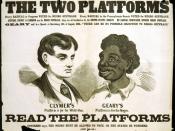The freedom of speech is an effective tool for the discovery of truth and the exposure of falsehood. The freedom of speech is also a central importance to a democratic government. The right to cast a vote means nothing if the vote is not informed. Citizens can only make a confident decision when faced with two competing policies if they are certain that they have heard the strongest possible arguments for both positions.
Freedom of speech, of the press, of association, of assembly and petition is set of guarantees, protected by the First Amendment, comprises what we refer to as freedom of expression. The Supreme Court has written that this freedom is "the matrix, the indispensable condition of nearly every form of freedom." Without it, other fundamental rights, like the right to vote, would wither and die.
Government can limit some protected speech by imposing "time, place and manner" restrictions.
Requiring permits for meetings, rallies, and demonstrations most commonly does this. But a permit cannot be unreasonably withheld, nor can it be denied based on content of the speech. That would be what is called viewpoint discrimination--and that is unconstitutional.
When protest crosses the line from speech to action, the government can intervene more aggressively. Political protesters have the right to picket, to distribute literature, to chant and to engage passerby in debate. But they do not have the right to block building entrances or to physically harass people.
Censoring so-called hate speech also runs counter to the long-term interests of the most frequent victims of hate: racial, ethnic, religious and sexual minorities. We should not give the government the power to decide which opinions are hateful, for history has taught us that the government is more apt to use this power to prosecute minorities than to protect them.



Good Essay!
Your essay helped me a lot in my essay for my highschool.
15 out of 15 people found this comment useful.